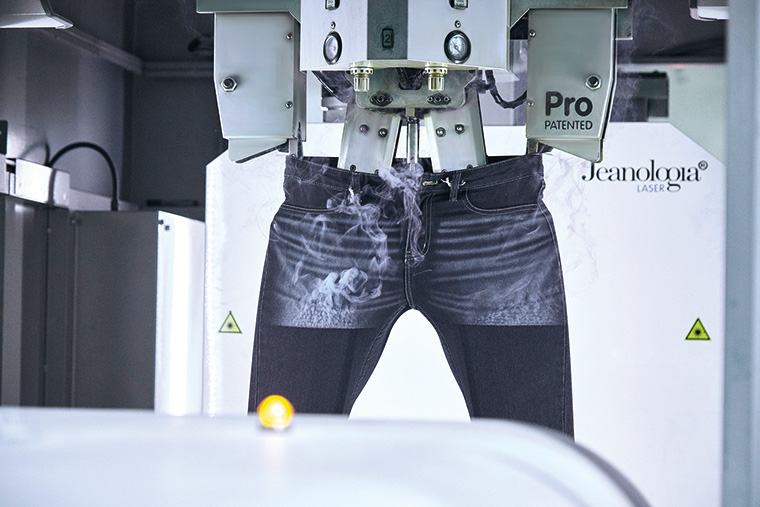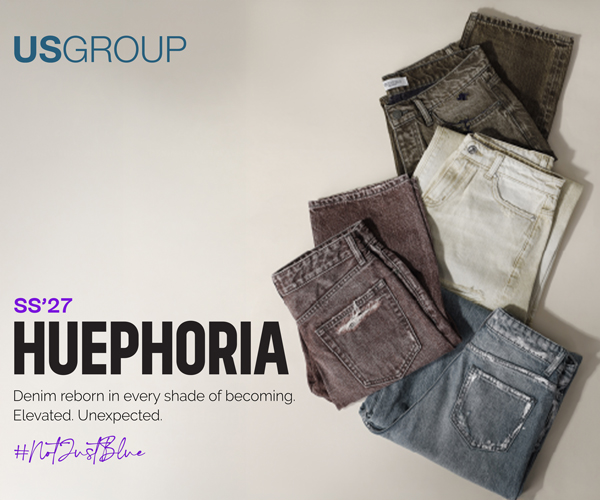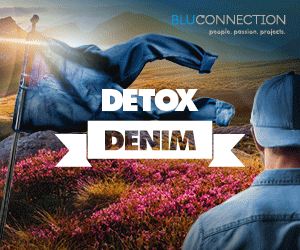
Sustainability at Scale
In its recently built LEED-certified denim-making facility, Interloop is deploying state-of-the-art technologies to offer brands the speed to market and authentic aesthetics they demand, on a sustainable industrial scale.
A vertically integrated apparel manufacturer based in Faisalabad, Pakistan, Interloop diversified into denim manufacturing in 2019, adding a new division and a fifth facility to its existing activities that include spinning, hosiery, knitwear and activewear.
In line with its commitment to lightening its impacts, Interloop’s newest division, located in Lahore City, is housed in a LEED Platinum certified facility that has been designed to minimise water, energy and chemical consumption. It is one of the largest facilities in the world to have achieved platinum certification within the Leadership in Energy and Environmental Design (LEED) framework.
Manufacturing processes similarly conform to the highest environmental standards, from ZDHC compliant chemicals to preferred raw materials. The need to guarantee provenance and back sustainability claims with reliable data is increasingly important, and Interloop has set up both a traceability system, with Looptrace, and a programme to support farmers seeking to switch to organic cotton. Looptrace tracks materials through the supply chain, and collects data on impacts at each stage. This system can be shared with its partners, and customers, to allow them to trace materials and monitor progress on their sustainability goals.
In its current configuration, Interloop denim has a production capacity of 6 million garments per year. This is just a first stage, as the company has already mapped out plans to expand capacity and add denim fabric manufacturing to its operations in 2025 with a projected production capacity of 14 million metres yearly to complete the backward integration.
Manufacturing 4.0

Interloop’s denim manufacturing facility takes full advantage of progress in automation, from cutting to sewing and to finishing. The flexibility and efficiency of these smart technologies give added leeway to the product development teams of brands. “Working in close partnership with customers is essential for many reasons, and our facility is designed to do just that,” says Fahid Hussain Kahlon, Assistant Vice President Denim for Interloop.
In addition to greater flexibility, digital industry 4.0 tools contribute both to reducing a product’s footprint and to shortening lead times. To cut back on the number of samples and speed up prototyping, the denim division has embraced digital design tools, such as CLO 3D Fashion Design and Jeanologia’s eDesign software, among others. These programmes have made a lot of progress in recent years and can now simulate designs and washes that are virtually the same as real life denim garments, the company says. Its comprehensive database of archives in jeans design includes lasering processes and patterns.
Cutting and sewing operations are also highly automated. Advanced cutting equipment has brought down this phase of manufacturing to 1 minute per garment, whereas traditional manual cutting can take 2.5 minutes per item. Interloop Denim says that its automated cutting functions speed up processing times by up to 70% using 60% less manpower, another sign of its lean, streamlined operations. These, combined with its industry 4.0 sewing equipment and an RFID-based tracking system, allow the company to manufacture up to 40,000 garments per day.
Next-gen laundry

The heart of the denim process, as Fahid Hussain Kahlon points out, is finishing and washing. Interloop has chosen to develop waterless processes whenever possible to reduce its impact on the environment and ensure safe working conditions for its people.
Interloop Denim boasts the largest in-house laser capacity in the region and can process up to 20,000 units per day depending on the complexity of the laser designs. The company has developed a high level of expertise in lasering that has made it a model of excellence. “Laser is a key technology for us. We have developed finishes that had never been achieved before, through unique training of the resources and based on the principle that there is “no other way than laser” which has been vetted by Jeanologia’s Brainbox team,” says Mr Kahlon. The company’s laser team is taking waterless finishing processes to new heights, and this is another one of the ways in which it is pushing the needle towards more sustainable denim manufacturing.
The company’s laundry also houses the region’s largest laser and ozone technology facility. Tonello’s Core and Up Technologies, powered by an auto dispensing chemical plant at Interloop Denim, achieves the ultimate combination of human skill and technology.
The laundry facility can run more traditional denim processes but it does so without compromising on worker safety nor on aesthetics. Potassium permanganate (PP), when needed or requested by a customer, is applied by a robot or in conditions that protect workers. Similarly, when a pumice stone finish look is necessary, the company uses bio chemicals or synthetic stones, such as those developed by HMS. These can be reused for up to 100 cycles and do not generate difficult to manage sludge. The company’s washing machines operate using nanobubble systems that radically reduce water consumption, by up to 90% the company estimates. Across all washing processes, Interloop Denim believes its advanced laundry equipment helps reduce water usage on average by 60%.
At Interloop, sustainability is not an option, it is the only way to produce jeans, says marketing executive Noor Jehan Sadiq, who goes on to add that 70% of the company’s washes are categorised, according to Jeanologia’s EIM score rating, as ‘low impact’ and 30% as ‘medium impact’. None are rated ‘high impact’.
Combined, these processes conform to the highest eco-responsible standards, such as the Jeans Redesign Guidelines recommended by the Ellen McArthur Foundation. In its first four years of operations, Interloop Denim has become a supplier for leading denim brands such as Guess, Hugo Boss, Mustang, Diesel and Target, to name a few. Its investments and expertise have made the young division a leading supplier in the denim industry, recognised for the efficiency and sustainability of its operations, in a relatively short time frame.
Beyond the scope of the factory itself, the company has also launched an outreach programme to support farmers transitioning to organic cotton with the Interloop Organic Kapas initiative. This direct-to-farm programme began working with 2,000 farmers in its first year. Interloop joined the Organic Cotton Accelerator (OCA) in 2020 and has partnered with the Lok Sanjh Foundation to track cotton from farm to gin and to delivery at its facility. The company plans to expand both the Looptrace and Organic Kapas programmes and reinforce the latter’s social impacts. This includes gathering data on farmers’ earnings, farm workers’ wages and hours to ensure best practices with regards to working conditions and environmental impacts.
Interloop Denim is thus at the cutting edge of denim making. “Starting this new division in 2019, Interloop had no choice but to invest in the most efficient and greenest technologies, we had no excuses,” says Ms Sadiq. Delivering sustainability at scale is the only way forward for Pakistan’s newest, and possibly most ambitious, denim maker.
https://denim.interloop-pk.com/











